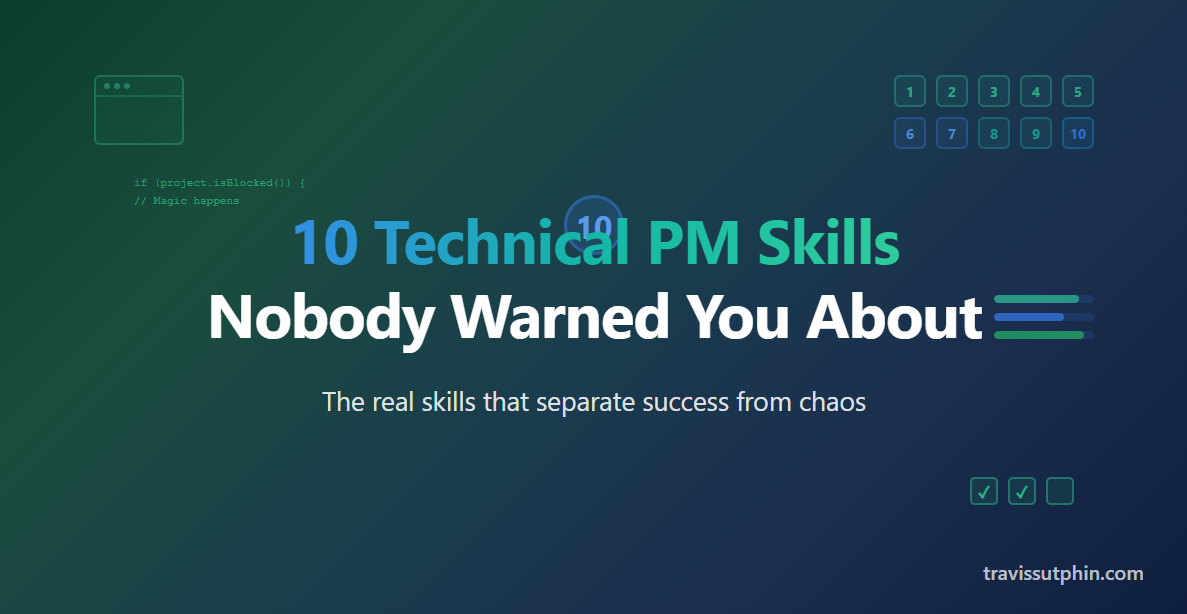10 Technical PM Skills Nobody Warned You About
Being a Technical Project Manager isn't about memorizing every JavaScript framework or knowing how to deploy Kubernetes clusters. It's about being the translator, the roadblock-clearer, and sometimes the person who says "no" to impossible timelines.
Here are the 10 essential skills that actually matter in the trenches:
1. Speaking "Engineer" Without Sounding Like a Robot
Why it's important: Engineers have their own language (e.g., "Just refactor the tech debt!"). If you nod along pretending you get it, disaster looms.
Real-world example: A dev says, "The API is throttling." You translate: "The system is overloaded, we need more servers or better code." Crisis averted.
Avoid: Fake understanding. Instead, ask: "Can you explain that like I'm five?"
2. Writing Down EVERYTHING (Because Memories Lie)
Why it's important: If it's not documented, it didn't happen.
Real-world example: A stakeholder claims, "You never told us about this risk!" You pull up the meeting notes where you did. Mic drop.
Avoid: Writing novels. Bullet points > paragraphs.
3. Knowing Just Enough Tech to Be Dangerous
Why it's important: You don't need to code, but you should know why "the database is on fire" is bad.
Real-world example: A dev says, "We need to migrate to Kubernetes." You ask, "Will this take 2 days or 2 weeks?" instead of "What's a Kubernetes?"
Avoid: Trying to code. Your job is to manage, not debug Python at 2 AM.
4. Herding Cats (aka Running Meetings That Don't Suck)
Why it's important: Engineers hate pointless meetings. Your job: make them worth it.
Real-world example: Instead of "Let's discuss the sprint," try "Here's the blocker, how do we fix it in 10 minutes?"
Avoid: Letting meetings drag. Set a timer. If it's done early, end early—hero status unlocked.
5. Telling Stakeholders "No" Without Getting Fired
Why it's important: Everyone wants everything yesterday. You're the reality check.
Real-world example: "Can we add AI to this toaster project?" You say: "Sure, if you want it delivered in 2027."
Avoid: Saying "no" bluntly. Try: "Let's prioritize, what's the MVP?"
6. Risk Management (AKA Predicting the Future)
Why it's important: Projects rarely go perfectly. Spotting risks early = fewer panic attacks.
Real-world example: "If we don't test this soon, we'll be debugging on launch day." Spoiler: You were right.
Avoid: Ignoring small risks. They grow into dumpster fires.
7. Juggling Priorities Without Dropping Any
Why it's important: Everything is "urgent." Your job: decide what actually is.
Real-world example: "The CEO wants a demo, but the devs are fixing a critical bug." You delay the demo. Crisis avoided.
Avoid: Saying "yes" to everything. Prioritize or perish.
8. Using Tools Without Getting Lost in Them
Why it's important: Jira, Trello, Asana—tools help, but don't let them eat your soul.
Real-world example: Instead of 20 custom Jira fields, you keep it simple: "To Do, Doing, Done." Bliss.
Avoid: Over-customizing. Nobody needs a 50-step workflow.
9. Being the Calm in the Storm
Why it's important: When things go wrong (they will), panic spreads fast. You're the chill voice.
Real-world example: The server crashes. You say: "We've got backups. Let's restore and diagnose." Team morale saved.
Avoid: Freaking out. Breathe. Then act.
10. Learning from Failure (Because It Will Happen)
Why it's important: Even the best projects flop. The key? Don't repeat mistakes.
Real-world example: A launch fails. You run a "post-mortem," find the root cause, and fix it next time. Growth!
Avoid: Blaming people. Focus on what went wrong, not who.
Final Tip: You Don't Need to Know Everything
The best TPMs ask questions, adapt, and keep the train on the tracks (most of the time).
Now go forth and manage—just don't forget the coffee.
Need a Technical Project Manager who's been through the chaos and lived to tell about it?
I've managed everything from AI integrations to complete system overhauls. Let's talk about getting your project unstuck.


Comments Coming Soon!
We're building a space for builders to share insights.
Start a Conversation →For now, reach out directly with your thoughts!